theartsdesk Q&A: Composer, chansonnier and conductor HK Gruber at 75 | reviews, news & interviews
theartsdesk Q&A: Composer, chansonnier and conductor HK Gruber at 75
theartsdesk Q&A: Composer, chansonnier and conductor HK Gruber at 75
On how Weill and Hanns Eisler gave him direction in the 1970s - and on meeting Lenya
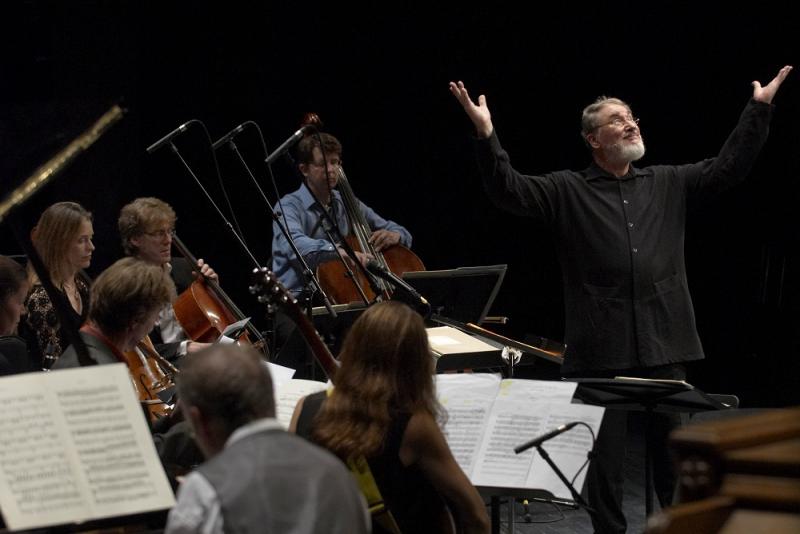
You haven't lived until you've witnessed Viennese maverick H(einz) K(arl) Gruber – 75 today (3 January, publication day) – speech-singing, conducting and kazooing his way through his self-styled "pandemonium" Frankenstein!!.
Before that, there had been a full orchestral concert of Gruber's larger-scale works with Sakari Oramo conducting the Royal Stockholm Philharmonic – the best performances, Gruber opined, he'd ever heard, including his own – as a large-scale interlude between a "Soup Concert" of Weill and Hanns Eisler (pictured below by Jan-Olav Wedin) with Gruber again the chansonnier, and Frankenstein!!
I spoke to Gruber on a rooftop room of the hall, the sun setting over the rooftops beyond the window at about 3pm (over an hour later, we were talking in the dark). Still reeling from the best delivery of classics from The Threepenny Opera and Happy End I'd ever heard, I wanted to follow up what Gruber had said between recital songs about the crucial influence of Weimar Republic music on his own composing style. He was not short of words, speaking in perfectly turned, Viennese-accented English.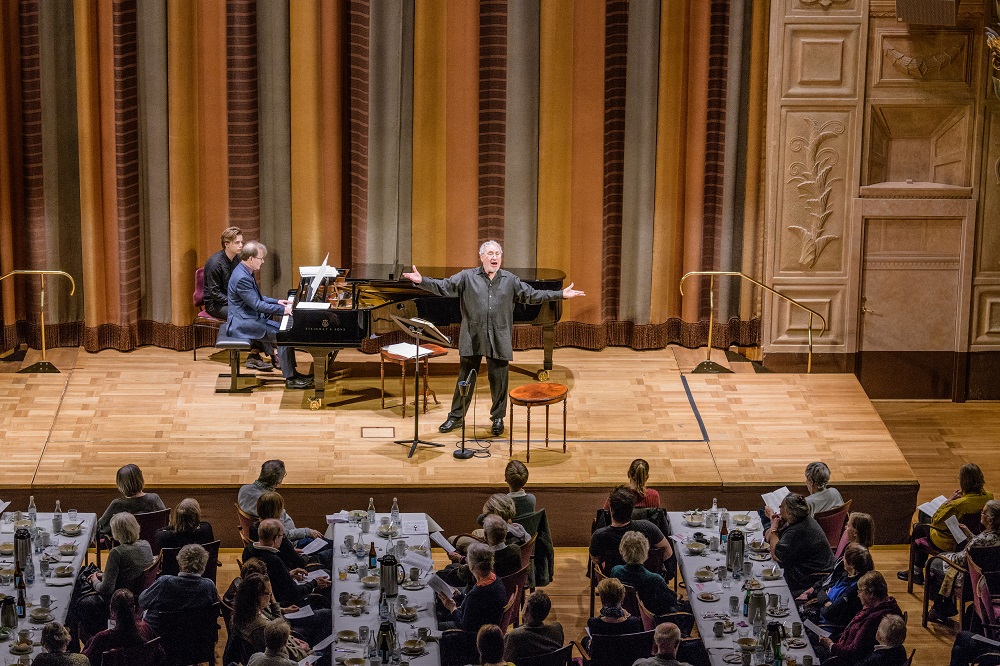 DAVID NICE That was such a wonderful lunchtime concert – I’d heard your Weill on CD but never experienced it live. So maybe a good place to start is this connection with Weill. You were saying in the recital that you really came to the music of Weill and Eisler in the 1970s, and it changed your way of thinking. So how did that evolution come about and how did it affect the way you composed?
DAVID NICE That was such a wonderful lunchtime concert – I’d heard your Weill on CD but never experienced it live. So maybe a good place to start is this connection with Weill. You were saying in the recital that you really came to the music of Weill and Eisler in the 1970s, and it changed your way of thinking. So how did that evolution come about and how did it affect the way you composed?
HK GRUBER: In the early 1970s I found a record with Gary Bertini conducting Weill’s First and Second Symphonies. And I read the notes by David Drew, and that was the first time I heard that Weill also composed symphonic music. In 1976 I wrote a letter to David Drew because I knew that meanwhile he was director of new music at Boosey & Hawkes. I sent him all my scores and tapes, and quite unexpectedly he answered that he was coming to the Vienna Festival to see a production of the one-act opera which is a small version of Gomorra, which later became a full-length opera, a variation of [Brecht and Weill's The Rise and Fall of the City of] Mahagonny. In time I got my contract with Boosey & Hawkes and then began a life-long relationship with the expert on Kurt Weill.
David looked after me and we made plans together – he, by the way, was the person who had the idea for Frankenstein!! – I signed the contract and a few days later he called me in Vienna and said "Nali" – this is my nickname from the time when I sang in the Vienna Boys Choir, and after the contract he asked me, What is your nickname, because all our other composers have nicknames, "Lenny" and "Ben"? – "you are a Boosey & Hawkes composer now, what do you think should be our first project? What could you make from your good old Frankenstein Suite", which was a piece I had composed for the "MOB art & tone ART" ensemble, which was a group of six musicians who were also actors – I sang – and for this group I composed the so-called Frankenstein Suite, which was background music for a recording by the poet [of these spooky children's rhymes embracing the heroes of youth] H. C. Artmann with extra text by the author.
David thought this was a very interesting idea and I should develop it. So he said, “Compose a cycle for chansonnier and orchestra." He called me three times a week and decided together with me which texts we should take from the book, and finally a year and a half later we were finished and we were looking for a title, which we thought should be, like the book, Fêtes Galantes, and in the same moment he said, "No, that’s completely wrong, it must be FRRRANKENSTEIN [delivered in true Gruber chansonnier style] with two exclamation marks."
Watch Gruber declaim and conduct "Herr Supermann" from Frankenstein!! with members of the Berlin Philharmonic
The original was how long?
Probably 15 minutes.
So it was expanded.
Completely recomposed and orchestrated, and added to. When it was finished, he invited me to London and a Proms concert which was conducted by a certain Simon Rattle.
In his early days.
Yes, it was with the London Sinfonietta in 1977. In this programme, I remember, they combined Schoenberg's First Chamber Symphony and Stravinsky's Pulcinella. And after the concert there was a dinner, and David said I should bring the new score, the ink was still wet, and then Simon asked to see it, while eating the soup, and after a while he said, "I’ll do it." On 25 November 1978 he gave the premiere in Liverpool. His father was my English coach, because I sang it in English; the original text is in German. But during all this time, I got lessons about Kurt Weill, on and on and on. And I began to discover, guided by David Drew, lots of Weill. Plus Hanns Eisler, but Eisler I discovered through [fellow MOB composer] Kurt Schwertsik, who for a short time was a member of the Communist Party and very interested in Eisler, and he said, "Come to me and I’ll play you something," and he played from Eisler's Hollywood Liederbuch.
So I began to discover Eisler, and these two composers were interesting for me because I had to find my own way as a composer to survive in the Sixties and Seventies – the official way of composing was Darmstadt, serial and 12-note, all those things – and I was looking for another possibility, and I had not been quite sure what I should do. Kurt Schwertsik said one day, "Let’s invent an alternative and call it MOB art," and we composed MOB pieces, and they should consist only of melody, rhythm and harmony. The idea was to write music for the people, uneducated, probably without culture, or rather they do not know about culture; the goal was to write music which they would understand, this kind of simplicity, without forgetting that we have learnt something from Schoenberg and Berg and Webern (pictured below: Gruber as Superman, taken from Barry Gavin's 1980 portrait film).
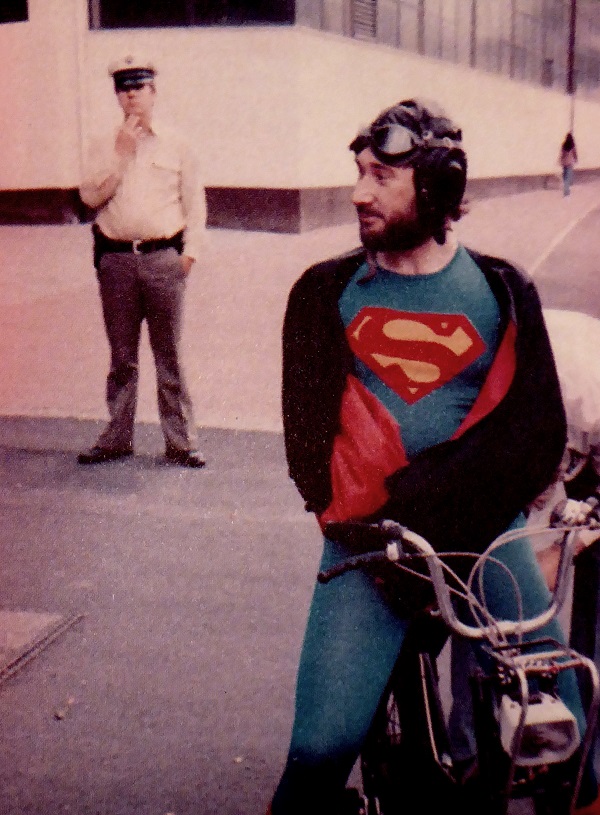
So the text comes first.
Absolutely. And when I was young, in the 1950s, the first opera which I found really good was Mahagonny, that recording with Brückner-Rüggeberg conducting, and Lotte Lenya singing, and this seemed to me a model of how opera should work. In the MOB art I began to sing again for the first time since leaving the Vienna Boys Choir – and to develop my singing style. I don’t call myself a baritone, I call myself a chansonnier. And what I do is what I’ve learnt listening to Ernst Busch [who was in the premiere of The Threepenny Opera]. Rolling rrrs, consonants which have to explode like bombs and sharp vowels, a-e-i-o-u, open, and now I give from time to time workshops for singers, and they can choose whatever they want to sing – Stockhausen, Schoenberg, Berio, John Cage or Bernstein, Cole Porter – and I just listen. And work with them on the pieces they bring and it’s completely independent, whatever they sing. It changes the world. They only have to develop a technique, how to produce a common denominator between their own bel canto technique and now reaching the goal of making every word understood.
This is what really impressed me today – I noticed your singing technique was superb, and you always sang the pitches, in the right registers. After you sang in the Vienna Boys Choir, did you carry on having singing lessons?
I had in the end of that time, I had classical singing lessons. But I have no technique now.
But it seems to me you do, to manage long phrases.
Oh, by instinct.
And your projection – I was surprised that you didn’t use the microphone for the singing. If I see Weill, it’s usually an opera singer who doesn’t have the right style, or a musicals singer who sings unstylishly with a microphone. Do you encourage your students to sing without a microphone?
I think one should use the microphone so that the listener does not recognise it being used. If it works without, it’s better. All these songs I’ve sung today [with piano] I did originally with a little instrumental ensemble, 10 to 17 musicians, then I work with amplification (pictured below by Jan-Olav Wedin in the Stockholm Frankenstein!!) 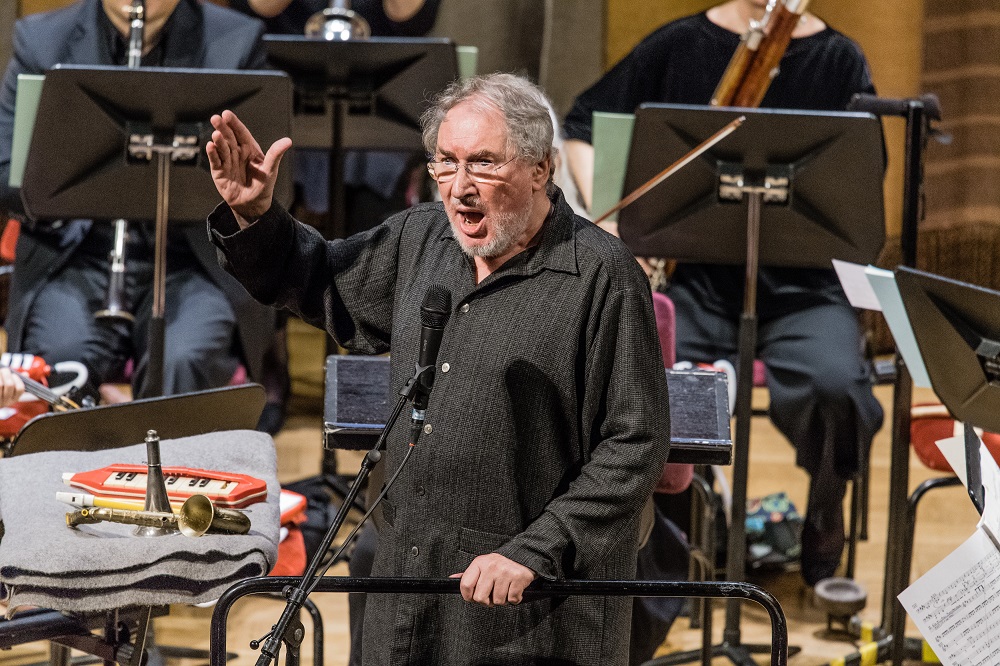 And it helps in bringing over the words. The voice can survive, but what is in danger is the text. And when you make agitprop or any thing like the Happy End songs where you don’t understand each word, it’s no fun.
And it helps in bringing over the words. The voice can survive, but what is in danger is the text. And when you make agitprop or any thing like the Happy End songs where you don’t understand each word, it’s no fun.
Happy End is total genius, isn’t it? Those songs are an advance on Dreigroschenoper, and I hadn’t heard the "Matrosen-Song" for so long – that stood out.
Total genius, yes. In Happy End the most interesting song which Weill ever composed is "Surabaya Johnny".
But that’s a song for a woman, so presumably you don’t sing it?
Oh, I do, often. I sing it whispering, with no voice [croons], nothing. When I sing it, I sing it as a voice, not a girl, just as someone who fell in love with this song. When you do the original instrumentation, it’s genius. On each word he’s changing some instrumental colour. That’s the symphonic quality. And when you compare the American Weill, there are many people who say it’s uninteresting, too simple, too American, it is because it’s often done incompetently. When you hear Danny Kaye, you hear how it has to be done. But when opera singers are doing it, it doesn’t work.
Street Scene requires some operatic voices...
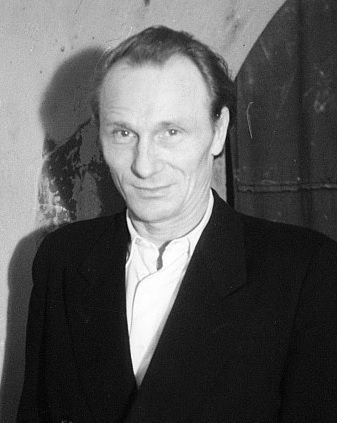 Yes. But opera singers have to make the so-called compromise and work on the text, and they have to develop this technique which comes from Ernst Busch (pictured right in 1946). Doesn’t matter how the voice sounds. I personally am not interested in a nice voice. Everybody has a voice, but the way the voice transports the text, that’s what I’m interested in. For me as an opera composer all these experiences I have had with the Weimar composer, in those 15 years, all those things came out like from a bomb. Before, from 1933, there was no democracy, and it is very interesting that our society in Austria still suffers also from the Nazi interruption, because between '33 and '45, everything was destroyed, our best musicians, composers and conductors had to escape, even this discussion, what is new music, did not exist as it exists today, without having all the Jewish composers here, and composing what they wanted to compose. I know that Franz Schmidt – we know him as a conservative composer, of wonderful symphonies – but he performed Schoenberg’s Pierrot Lunaire. So there was always a bridge between the so-called avant-gardists and so-called conservatives. I don’t think in those terms. For me, everything must be connected and musical intelligence must always be invested.
Yes. But opera singers have to make the so-called compromise and work on the text, and they have to develop this technique which comes from Ernst Busch (pictured right in 1946). Doesn’t matter how the voice sounds. I personally am not interested in a nice voice. Everybody has a voice, but the way the voice transports the text, that’s what I’m interested in. For me as an opera composer all these experiences I have had with the Weimar composer, in those 15 years, all those things came out like from a bomb. Before, from 1933, there was no democracy, and it is very interesting that our society in Austria still suffers also from the Nazi interruption, because between '33 and '45, everything was destroyed, our best musicians, composers and conductors had to escape, even this discussion, what is new music, did not exist as it exists today, without having all the Jewish composers here, and composing what they wanted to compose. I know that Franz Schmidt – we know him as a conservative composer, of wonderful symphonies – but he performed Schoenberg’s Pierrot Lunaire. So there was always a bridge between the so-called avant-gardists and so-called conservatives. I don’t think in those terms. For me, everything must be connected and musical intelligence must always be invested.
Do you think that the whole grip of the Darmstadt School was an obsession with doing away with the old and saying, we have to start again?
I think Darmstadt made a few mistakes. Mistake Number One was that their behaviour was dictatorial. We all know that [the composer Hans Werner] Henze said, we have had enough of dictators, I don’t want to have to deal with all that any more. They developed a very interesting kind of Fascism. That was rediscovered in the 60s. Therefore we developed our MOB art and so-called new simplicity. In the concert yesterday [the repeat of which I heard after the interview] they played three pieces of mine which I don’t think are part of the new simplicity. What I learned from the Weimar Republic were the many possibilities we have to reach our goals. One should never say this is the only way, if we co-operate we find for one problem one way, for the next problem another way. I think that after '45, in the GDR they re-discovered a few of the lost things they had before in the Weimar Republic. Eisler was living in the GDR and influenced the musical life a lot – he died in 1962, much too early – and the musical life was very progressive. Also in the west. The Berliner Ensemble continued in the eastern part of the city, very interesting.
They still produce incredibly high quality work.
It’s still the same. And you hear in the background the Brecht influence. This is my childhood. These are my roots. Whenever the Berliner Ensemble came to Vienna I would be there, and when I was in Berlin, mostly in the East, I went to the theatre and concerts.
Eisler still hasn’t come on to the map as far as Britain at least is concerned, he trails behind Weill...
Do you remember the Almeida Festival? Pierre Audi was the intendant in 1984, I was invited together with Schwertsik, Friedrich Cerha, Ligeti, Krenek, and I performed pieces by Cerha which he wrote for me as a chansonnier, translated into English by Krenek. And Pierre Audi asked me, could you suggest an unknown Viennese classical composer of the 20th century which we could present here as a contemporary? I said Eisler, but they said, no, he’s East German. I said no. He always had an Austrian passport, and when he was thrown out of the States in 1947, he came to Vienna, he thought he could get a job as a teacher. They hesitated and told him a lie, there is no job for you, because then they had help from the Marshall Plan, and they knew he came directly from the States, the McCarthy trials, because of Un-American activities, and there were the Americans. 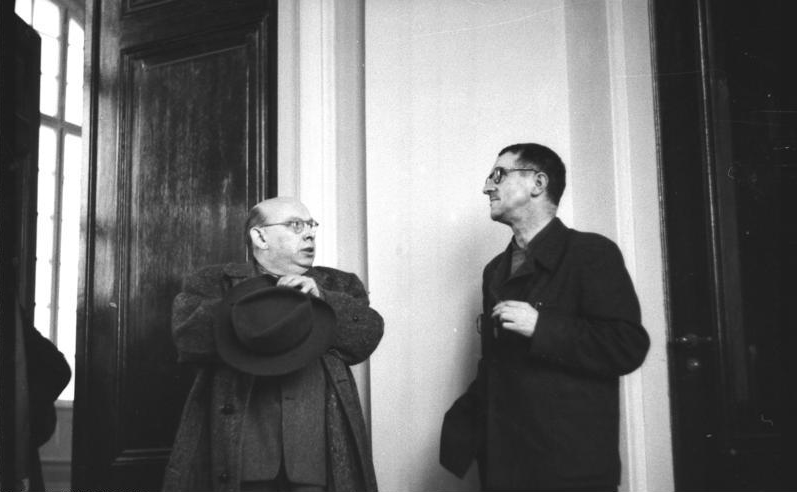 And Eisler was a so-called communist. He was never a member of the party. In this situation he called Brecht and Brecht said, come to Berlin, I have a theatre and we can continue working as we did before the war (pictured above: Eisler and Brecht in 1950). But for Eisler the GDR thing was fine, he had a nice flat, and he was teaching – Sandy Goehr, by the way, was a pupil of Eisler. The only problem he had at that time, there was no reason for any agitprop, because he was now living in a nice little garden, GDR, and they thought, this is now the ideal place, no need for agitprop. He composed very good music, but the reason to compose – he had not very interesting enemies. Well, the Communist Party was a kind of enemy, but he had to be loyal. He thought before the war the communist idea was an illusion; after the war it was a party, a real thing. For him it must have been a shock sometimes to wake up and think, this is the real Communism? My dream had other goals. But he remained Austrian. So Pierre Audi said, that’s fantastic, so we made an Eisler evening, John Willett was the Brecht translator, and he had much more experience than I did – I just got what I from the widows, I knew Steffi Eisler, I knew Lotte Lenya, but Willett was there so he knew it from the roots.
And Eisler was a so-called communist. He was never a member of the party. In this situation he called Brecht and Brecht said, come to Berlin, I have a theatre and we can continue working as we did before the war (pictured above: Eisler and Brecht in 1950). But for Eisler the GDR thing was fine, he had a nice flat, and he was teaching – Sandy Goehr, by the way, was a pupil of Eisler. The only problem he had at that time, there was no reason for any agitprop, because he was now living in a nice little garden, GDR, and they thought, this is now the ideal place, no need for agitprop. He composed very good music, but the reason to compose – he had not very interesting enemies. Well, the Communist Party was a kind of enemy, but he had to be loyal. He thought before the war the communist idea was an illusion; after the war it was a party, a real thing. For him it must have been a shock sometimes to wake up and think, this is the real Communism? My dream had other goals. But he remained Austrian. So Pierre Audi said, that’s fantastic, so we made an Eisler evening, John Willett was the Brecht translator, and he had much more experience than I did – I just got what I from the widows, I knew Steffi Eisler, I knew Lotte Lenya, but Willett was there so he knew it from the roots.
Did you have conversations with Lotte Lenya?
Na ja. It was on the 12th of August 1980 that I met her, by accident. Since David Drew was THE Weill expert, everything I know about Kurt Weill I know from him, and every time I conducted Weill I got the information from him which you don’t get from books. He was my teacher. So on 13th August I had the first performance of Frankenstein!! in the orchestral version at the Tanglewood Festival. And as my Director of New Music, David came with me. And on the day before the premiere, he said to me, by the way, do you want to meet Lotte Lenya (pictured below by Carl Van Vechten in 1962)? And I wondered, how is that possible? I knew her from pictures, books, records, I did not realise she was still alive. She’s Viennese. In fact we would have been neighbours. I’m from Ottakring which is on the western side, and she came from the 13th district next to it.
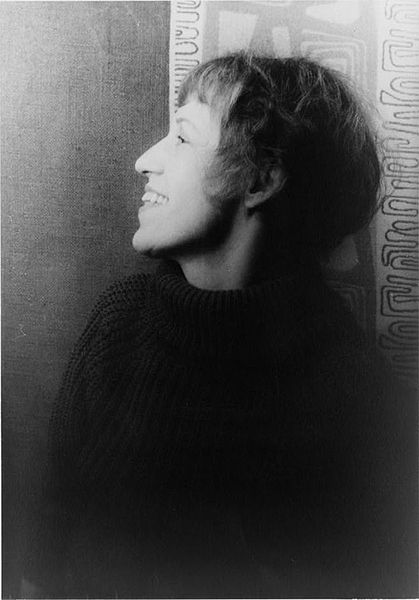 You know she had an agreement with Kurt Weill not to speak German again when they left Europe on the ship, they had to swear it. They wrote letters to each other in English, interesting Euro-English. So I said ja, ja, I had a car, we drove to the house in which Lenya had lived with Kurt Weill. We came in, and spent a whole afternoon and evening and spoke and spoke. She told us stories about a recent production of Mahagonny at the Metropolitan Opera, and how fantastic it was for her because it was so rich.
You know she had an agreement with Kurt Weill not to speak German again when they left Europe on the ship, they had to swear it. They wrote letters to each other in English, interesting Euro-English. So I said ja, ja, I had a car, we drove to the house in which Lenya had lived with Kurt Weill. We came in, and spent a whole afternoon and evening and spoke and spoke. She told us stories about a recent production of Mahagonny at the Metropolitan Opera, and how fantastic it was for her because it was so rich.
That would have been John Dexter’s production with Teresa Stratas...
And Levine conducting. We discussed the problem of the American Weill not being performed with the original instrumentation. So Weill was the only composer on Broadway who made the scoring himself. All the other composers gave it to arrangers [moon-faced starry-eyed]. There came a moment when she asked me, by the way, what are you performing tomorrow, and I told her it is the American premiere of Frankenstein!! for chansonnier and orchestra based on texts by HA Hartmann. Ah, very interesting, she said. Could you sing the piece for me without orchestra, but please sing all the orchestral parts for me where you can, I want to hear what it’s doing while you are singing. So I began “Plimp – Little Mouse, little mouse, take me to his mousy house,” here you can hear the harp and there is an inner voice, and so on. So the piece takes about 30 minutes, and because of the interruptions, my comments and illustrations, the whole show took about 60 minutes. And I would say, is this enough, and she would say, no, no, go on, I want to hear all these things. And then we came to the end – “this little book is done – pum pum pum pum pum – see the mouse run – pum pum pum pum – catch the mouse, then you can make from him such a fine pistol holster,” “and here you hear an E major chord and in the bass is a B”. Then I’m finished. And she looked at me and jumped up: “This is a marvellous piece. And the scoring is perfect! Absolutely brilliant.”
Then she said, “But the humour of this text reminds me of Vienna.” Now I knew, we are in our home country, in our city, “It reminds me of these songs” – she spoke English with a Viennese accent [which he now repeats in vigorous impersonation] – “it reminds me of these songs sung on the borders of the city in these wine gardens.”
Heurigen?
You’re right, I said “Heurigen songs”. “Ja, ja, can you sing a Heurigen song for me?” I don’t like this Viennese style at all, it’s too smeary, that’s what I described beyond other things in this piece Charivari which you’ll hear tomorrow, this kind of Austrian Gemütlichkeit. Disgusting, ja. And I said, “Well, I’ll being to sing a Heurigen song but I don’t know if I know the whole piece”. [Begins to sing] And in this moment, she took my arm and linked it with hers and sang this song with me, the right melody and the right text, in German, and I improvised a second voice and we sang it to the end. So I sang with Lotte Lenya, linked arms, a Viennese folksong. Very interesting.
Very moving.
After all this immigration and all that war. This was 1980, she must have been nearly 82. I was so impressed with her memory, and I said to her in English, I’m so impressed with your Viennese dialect singing, and then it exploded and she said in Viennese dialect, “It’s because I’m from Breitensee.” Then she continued in English. But in this moment I could hear her speaking in the proper Viennese dialect.
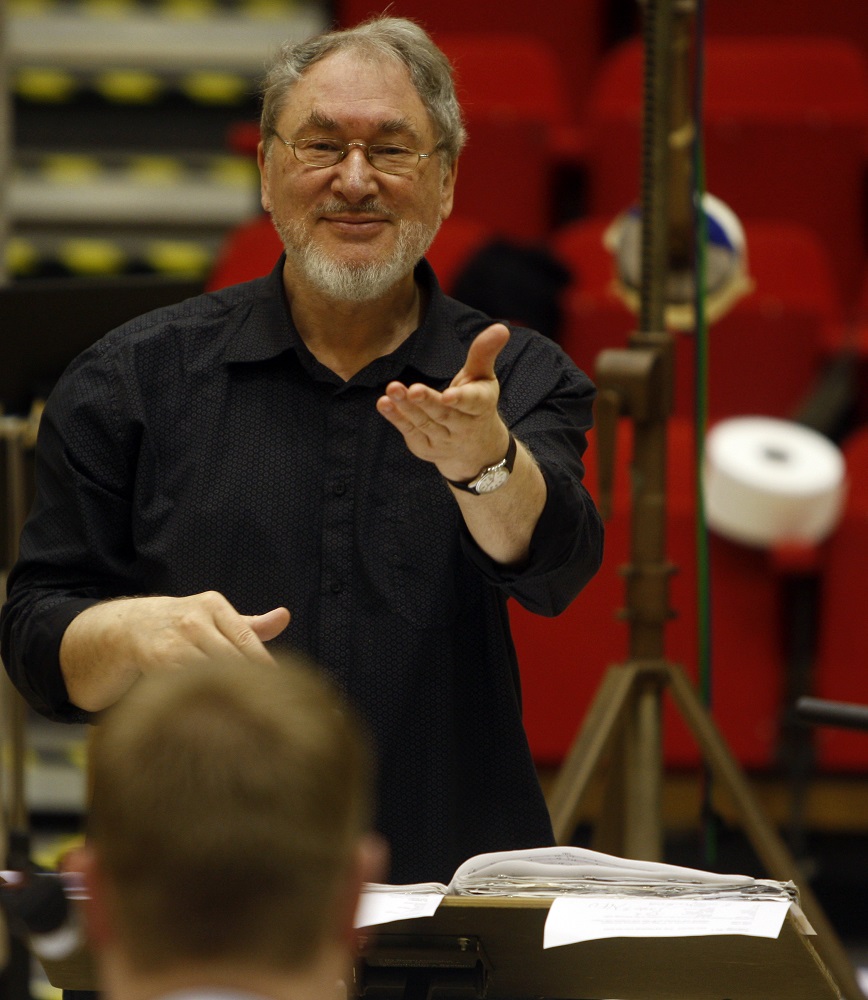 How you brought that to life! (Gruber pictured right by John Super)
How you brought that to life! (Gruber pictured right by John Super)
And David Drew was there. David co-operated a lot with Lotte Lenya. In fact she wanted him to be the President of the Weill Foundation. But David didn’t want to be involved in all that.
Difficult politics, perhaps – certainly they became more difficult after Lenya’s death.
Of course. Now the President is Kim Kowalke. That was a better solution. David was interested in Kurt Weill but also in his own composers. Without David Drew I would not exist. He came to Vienna because he was interested in me and I was 33 years old when I met him and he more or less built me up, created me and gave me more and more backbone – whenever I had a problem and it was two o'clock in the morning, it was possible to call him and ask him what he would do. So he was always there. He was my big brother, father, whatever.
These people are very rare – where are they now?
Where do you find a Director of New Music like him? Because he created me, but he also created composers like Robin Holloway. He co-created Steve Reich and John Adams, he brought Messiaen to Great Britain, and before he died he was working on a very interesting project about Walter Wagner-Régeny who was a very good friend of my teacher Gottfried von Einem. He lived in Germany before the War, he was performed in Berlin and Vienna – it was said he was a Nazi, he was not.
Schmidt had this problem as well.
He had this problem because he started composing a cantata for the Nazis. He died before it was finished, in 1939, it was never composed. You can see the autograph of this cantata. Pfitzner also sympathised, Webern also, and I don’t understand that really, because Webern was a victim, he was not performed, he was on the list of Degenerate Composers, but he said, "Ja, this is a new brush and probably this development will be civilised in a few years". But in 1941 when the Nazis occupied France, he sympathised.
So in fact if the Viennese would have been honest and given Eisler a job, I personally would have been a pupil of Eisler. I only knew Erwin Ratz, who was a friend of his and Webern’s, and I was Ratz’s pupil. But in the same time he was the President of the Mahler Foundation. And therefore in the arrangement of Eisler’s he made which I performed this afternoon, I made the silly joke that in this foxtrot you can hear the relationship to Mahler.
OK, that was your humour, I was actually waiting for the Mahler touch. If only because in Street Scene and The Seven Deadly Sins you sometimes hear Weill’s closeness to Mahler.
He is very often near, I agree. Wagner, too [sings the refrain of the “Alabama Song”] And Mahler [sings a passage from Weill's Second Symphony], this trumpet solo is a homage. And two of the scenes in The Seven Deadly Sins [more singing]. This is a very Mahlerian piece. And it is for me the most interesting piece of Brecht and Weill. Because Weill did not often use a big string orchestra, but in this piece he really composes to bring you to tears. 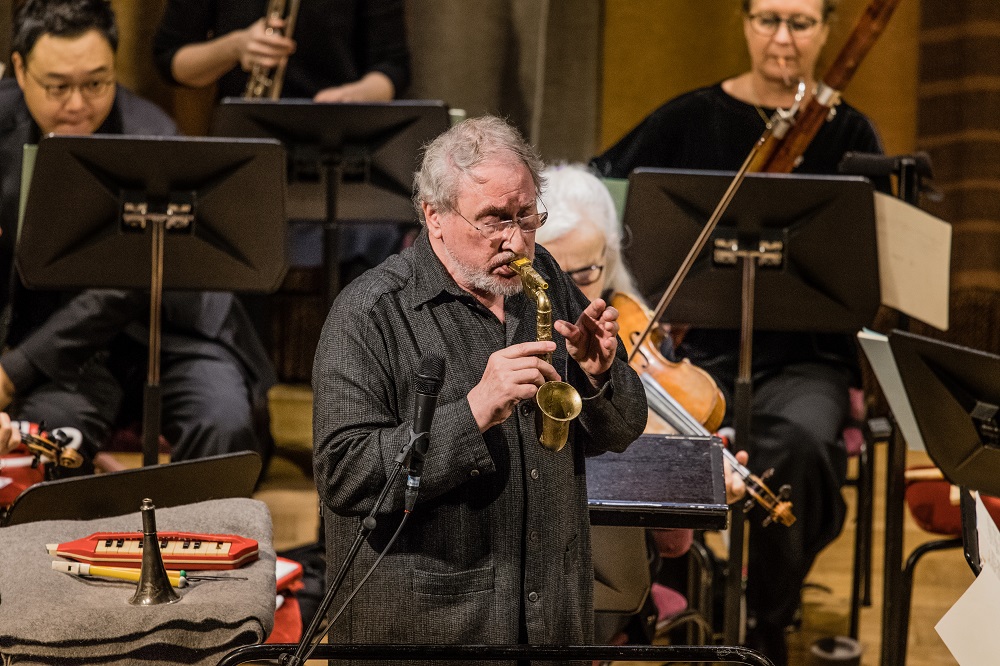 You played double bass for 40 years (pictured above by Jan-Olav Wedin: Gruber playing a very different 'instrument' in the Stockholm performance of Frankenstein!!), which taught you – I glean from what you’ve said – everything about instrumentation.
You played double bass for 40 years (pictured above by Jan-Olav Wedin: Gruber playing a very different 'instrument' in the Stockholm performance of Frankenstein!!), which taught you – I glean from what you’ve said – everything about instrumentation.
Na ja, nearly everything. This is an area with many things in it which I have not discovered so far, but the most important things you can learn as composer and conductor you learn sitting in an orchestra. Watching conductors, watching composers, playing new music as much as possible. And not only music you like – very interesting to play music you don’t like, you learn discipline, ja? It happened several times that the music which I didn’t like at first I did like after we worked it out with a good conductor. I really had a good time in the orchestra. Forty years is a little bit long, but during this time I sat in the orchestra, but I also conducted and I was always composing. My problem was that I was sitting in Austria and in Vienna, and my way of composing was always in opposition to what the so-called experts said is official modernism.
Was there a rigid structure there in Vienna, too, that it should be dodecaphonic…
Darmstadt, serial, it should be this or this. My deadly sin was Frankenstein!! The premiere of Frankenstein!! was ’78, Liverpool Philharmonc, with Simon, and the very first Frankenstein!! performance in Vienna was ’85. Still in these days they said, this is a mistake, an accident. And it is still now successful, in 2018 Franki – I call it Franki – will be 40 years old.
It’s very intricately wrought. Would you say it’s the essence of your style, or that you’ve moved on since then?
I think my music developed a lot…
But there’s a playful element which people mistake for levity. Do you still have this problem that there’s an attitude from certain critics that because there’s an element of play, it’s not serious?
That is something which happens from time to time. Well, that’s me!
Frankenstein!! also has a Viennese fantastical quality. I’m reminded of the writer and human rights activist Janne Teller, who has mixed Austrian and Danish parentage. And she was recently talking about her life and saying that the practical, sunny, lucid side possibly comes from her Danish roots, and her darker, more fantastical side comes from Austria. I thought this was pertinent, in that you’re now in Sweden, which is in some ways a rational country, though there was Strindberg… Is this a different environment for you?
I feel very, very at home here. In 1996 I was invited for the first time to the Swedish Chamber Orchestra, since that time I’ve worked with them regularly. I know the orchestras here very well, and I must say they’re absolutely fantastic. I could not be more impressed with Sakari Oramo [who as Principal Conductor of the Royal Stockholm Philharmonic was due to conduct Charivari, the recently-composed Piano Concerto for Emanuel Ax and Dancing in the Dark, originally for Rattle and the Vienna Philharmonic], He conducted my music in the beginning of 2000 with the City of Birmingham Orchestra; they toured Ariel [for trumpeter Håkan Hardenberger] to Spain, France and Austria. (Pictured below: Oramo conducting in the Gruber Festival). 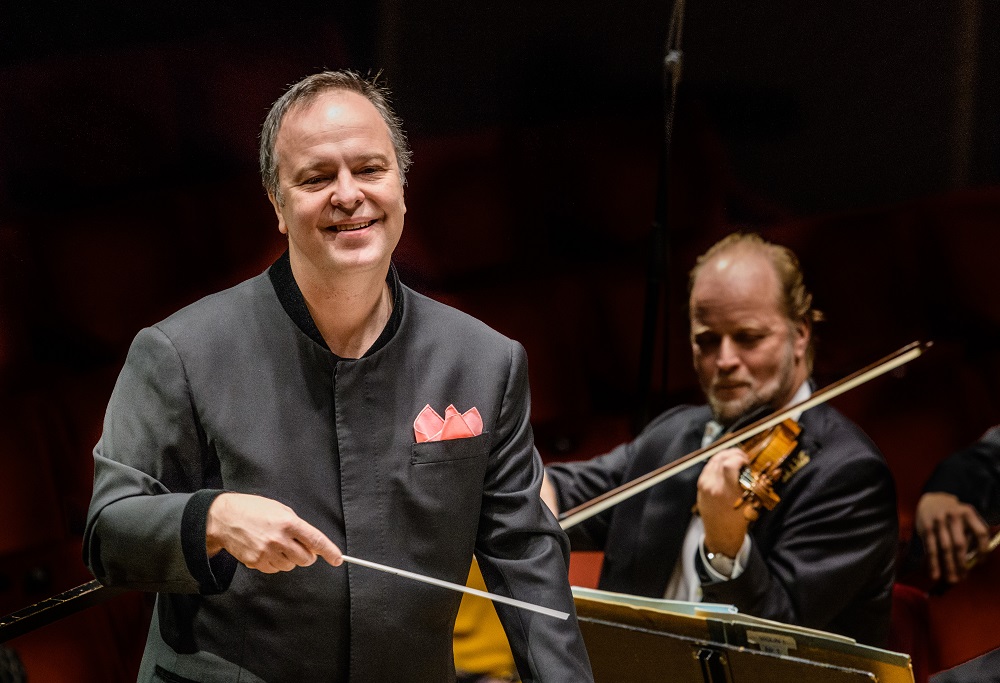 So he’s used to conducting my music. Yesterday it was very interesting to watch him, I had heard him also rehearsing. I closed my scores and watched him and knew he recognises everything. When something is not clear, he makes sure it is clear. And his body language is so – he gives no chance for being imprecise. So he really supports the precision in music, which in my music is so important, because there are many elements like peasants, which are inimical to each other, and if that is not precise, you get rubbish.
So he’s used to conducting my music. Yesterday it was very interesting to watch him, I had heard him also rehearsing. I closed my scores and watched him and knew he recognises everything. When something is not clear, he makes sure it is clear. And his body language is so – he gives no chance for being imprecise. So he really supports the precision in music, which in my music is so important, because there are many elements like peasants, which are inimical to each other, and if that is not precise, you get rubbish.
Finally, how do you feel about your Austrian roots? You fight against Schrammel, the traditional Viennese music. I’m curious to know what you think of something like Der Rosenkavalier, which the Viennese think of as "their" opera.
It’s not a problem for me, it’s a great opera, I like Richard Strauss a lot. And it was funny for me, because my most recent opera is Tales from the Vienna Woods, which was premiered at the Bregenz Festival, it was done at the Komische Oper in Berlin, and this year it was done in Hagen In Germany, a small opera house, but a very good performance. So in this case because Ödön von Horváth [the author of the original play] is about waltzes, I had to play with the element of waltzes, so suddenly I had to be in concurrence to Richard Strauss, but his music is full of meat, ja?, and my Rosenkavalier in Tales from the Vienna Woods is only the bones.
You say Strauss's opposite Stravinsky is your main god.
I have hundreds of gods, but Stravinsky is the common denominator for everything I find necessary.
Explore topics
Share this article
The future of Arts Journalism
You can stop theartsdesk.com closing!
We urgently need financing to survive. Our fundraising drive has thus far raised £49,000 but we need to reach £100,000 or we will be forced to close. Please contribute here: https://gofund.me/c3f6033d
And if you can forward this information to anyone who might assist, we’d be grateful.

Subscribe to theartsdesk.com
Thank you for continuing to read our work on theartsdesk.com. For unlimited access to every article in its entirety, including our archive of more than 15,000 pieces, we're asking for £5 per month or £40 per year. We feel it's a very good deal, and hope you do too.
To take a subscription now simply click here.
And if you're looking for that extra gift for a friend or family member, why not treat them to a theartsdesk.com gift subscription?

Add comment